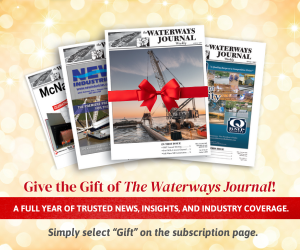Washington, D.C. – Dramatically different versions of a major defense measure important to the maritime industry have advanced in both houses of Congress.
Largely along party lines in a 217 to 199 vote, the Republican-led House approved its version of the annual National Defense Authorization Act (NDAA) for fiscal year 2025.
H.R. 8070 moved to the Democratic-controlled Senate, which is expected to reject hot-button amendments on a number of topics.
“Unsurprisingly, the legislation coming out of the House is loaded with anti-LGBTQ, anti-choice, anti-environment and other divisive amendments guaranteed not to pass the Senate,” Senate Majority Leader Chuck Schumer (D-N.Y.) said.
In its Statement of Administration Policy, the White House also listed objections to specific provisions in the bill.
Still, House Speaker Mike Johnson (R-La.) praised his chamber’s passage of the bill, singling out its 19.5 percent pay hike for junior enlisted military members and provisions requiring merit-based promotions and preventing Chinese espionage in the military and supply chains.
Provisions in the massive bill important to the maritime industry include those on the Maritime Administration, the U.S. Merchant Marine, state maritime academies and their training vessels, the U.S. Marine Highway Program, the Maritime Security Program and Port Infrastructure Development grants.
On the Senate side, the Armed Services Committee easily advanced its version of the NDAA by a vote of 22 to 3.
One of the no votes, however, came from Sen. Jack Reed (D-R.I.), the committee’s chairman.
“I regret that I needed to vote against passage of this bill because it includes a funding increase that cannot be appropriated without breaking lawful spending caps and causing unintended harm to our military,” Reed said.
Senate Minority Leader Mitch McConnell (R-Ky.) welcomed the $25-billion increase approved by the committee on a bipartisan vote.
McConnell noted the spending agreement reached last year does not reflect where the world is now.
He dismissed as absurd Democrats’ insistence on equity for defense and non-defense spending increases.
MarAd RFP
The Maritime Administration (MarAd) issued a request for proposals (RFP) to establish the first United States Center for Maritime Innovation.
With funding of up $2 million available through a competitive cooperative agreement with MarAd’s Maritime Environmental and Technical Assistance (META) program, the center is to be virtual.
According to MarAd, the center will support the study, research, development, assessment and deployment of emerging marine technologies and practices related to environmental challenges facing the maritime transportation system.
MarAd is seeking proposals from organizations to establish and maintain the center and serve as its secretariat.
The center must be established within six months of the award, and projects must be initiated within one year.
Eligible applicants include private entities and nonprofit organizations; local, regional and state governments, including special districts; tribes, including a consortium of tribes; and institutions of higher education.
Applications must be submitted by 11:59 p.m. EST on July 17 in PDF format via email to Christian.Onwudiegwu@dot.gov. For questions related to technical or programmatic aspects of the RFP, contact Carolyn Junemann at carolyn.junemann@dot.gov.
FMC Advisory
In an industry advisory, the Federal Maritime Commission (FMC) stated that common carriers publishing automated tariffs as vessel-operating common carriers (VOCCs) must operate at least one vessel in common carriage in the foreign commerce of the United States to maintain their status.
“Organizations offering common carriage that do not operate at least one vessel are considered non-vessel-operating common carriers (NVOCCs),” FMC stated, adding the licensing, registration and financial requirements for NVOCCs are set forth in 46 C.F.R. Part 515 and are different from those VOCCs must meet.
“Operating as an NVOCC and failing to meet all relevant requirements may result in a civil monetary penalty,” the FMC said.
Questions regarding VOCC status can be addressed to the Bureau of Trade Analysis at tradeanalysis@fmc.gov.
Baltimore Impact
Following the official reopening of the Port of Baltimore, two key Biden administration officials met with businesses and supply chain industry partners to discuss restoring business since vessel traffic was suspended after the March 26 collapse of the Francis Scott Key Bridge.
According to a readout of the meeting, Transportation Secretary Pete Buttigieg thanked participants for stepping up to keep workers employed and mitigate the fallout to the local community and the country.
He also shared how his agency was able to expand capacity for additional cargo at Tradepoint Atlantic and use its Freight Logistics Optimization Works (FLOW) initiative to improve visibility into cargo being re-routed to other East Coast ports.
National Economic Advisor Lael Brainard discussed the administration’s whole-of-government approach to tackling economic disruptions, keeping costs low across the supply chain and helping Baltimore rebuild from the collapse.
She cited President Biden’s Supply Chain Disruption Task Force for helping to troubleshoot challenges, reroute cargos temporarily and ensure shippers remain committed to a full return to Baltimore.
Businesses credited the administration’s decisive action with helping to save jobs and the quick removal of debris by the U.S. Army Corps of Engineers to allow vessels to return.
Great Lakes Advisory Board
The Environmental Protection Agency (EPA) is requesting nominations from a diverse range of qualified candidates to serve on the Great Lakes Advisory Board (GLAB), which provides advice to the EPA administrator on the Great Lakes Restoration Initiative and the Great Lakes Water Quality Agreement between the United States and Canada.
Nominations should be submitted by July 30 and be sent via email to davicino.alana@epa.gov with “GLAB Nominations 2024” in the subject line.
The EPA will consider candidates from a broad range of Great Lakes stakeholders, including environmental groups, agricultural groups, industry and/or business groups, citizen groups, environmental justice groups, foundations, academia and state, local and tribal governments.
For additional information, contact Alana Davicino at 312-886-2307 or davicino.alana@epa.gov.



